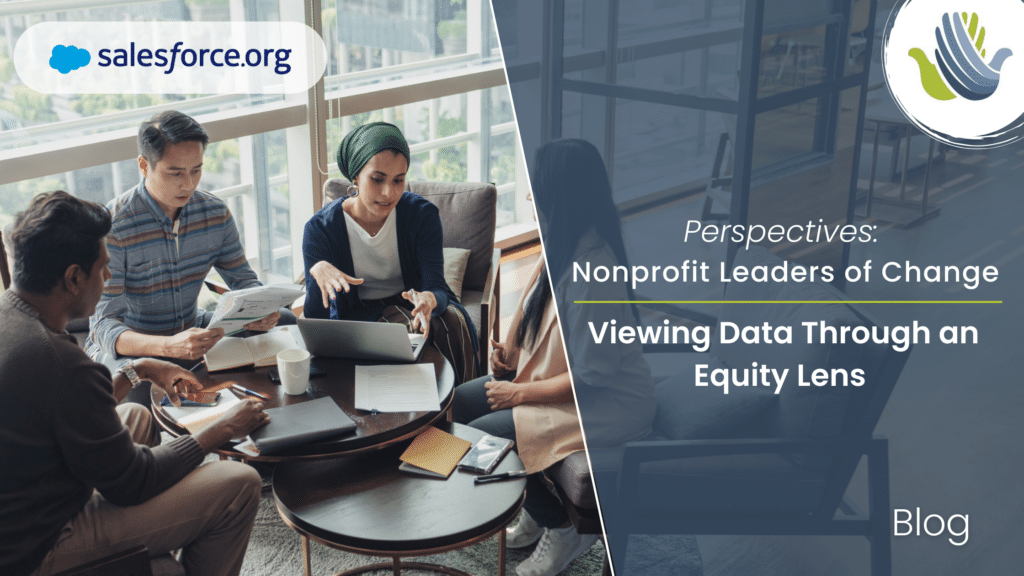Viewing Data through an Equity Lens
An equity lens should be at the forefront of planning and management for any organization. And when it comes to data collection, diversity, equity and inclusion (DEI) should also be a focal point. In this article, we will discuss what it means to examine existing policies and practices with an “equity lens,” particularly when it comes to nonprofits.
In short, it means maximizing the impact of your organization. But how? By using data to analyze the effect of the design and implementation of policies on under-served and marginalized individuals and groups, and identifying and potentially eliminating barriers. An equity perspective helps answer questions such as: who is your audience, who needs your services, how can you best serve them, and how do you continue to evolve?
Establishing Your Target Audience
When a client needed data on child sex trafficking survivors, Provisio suggested implementing Salesforce’s program management. The biggest challenge they faced was collecting data from a mobile population that had several addresses and contacts related to a single client. Another challenge is that not much current research was available for their survivors because of their mobility.
The data they were able to start collecting through Salesforce proved to be a goldmine in helping this organization find its audience. They were able to pinpoint hotspots around the communities where traffickers were operating, the types of recruitment practices they were using, as well as the average age of the survivors and their ethnicities. That information allowed them to identify trends and key information to help those within the community and to determine where they needed to do more direct outreach.
Pinpointing Where Services Are Needed

But MAAC gained so much more than a streamlined system. The data they collected using Salesforce Tableau CRM provided new insight into how to approach their work thoughtfully, through an equity lens. The information enabled them to deliver on their mission -– serving those who need them most -– and revealed an unanticipated population of users.
“Our history is that we’ve traditionally served the Latino community, and so we oriented a lot of our outreach and marketing and even our materials to Spanish-speaking individuals,” says Dr. Taylor Harrell, Director of Learning and Evaluation at MAAC. “And although some people started saying, ‘I think we’re getting a lot of Arabic speakers, we did not have the data to support what frontline staff was noticing.”
However, when MAAC implemented Salesforce and drastically enhanced the quality of the demographic data being collected, they found that several programs served as many as 14% of Arabic speakers. MAAC’s efforts then shifted to developing materials in Arabic, hiring Arabic-speaking workers, and exploring outside research on Arabic human services.
“I think in this day and age if you want to understand your community, you must collect demographic data about them,” Harrell says. “For MAAC, it helped us address long-held assumptions we’ve had about our organization and our participants. The equity lens has shifted the way data is being collected as well as the types of data being collected.”
Continuing to Evolve Equitably
For many nonprofits that serve marginalized communities, equity is a core value and an orientation that informs the work that they do. So when data challenges assumptions – about specific identities or identity groups – it’s important to adjust operations or materials to better reflect reality. You see it all the time today in organizations: from hiring dedicated staff such as a Director of Diversity and Inclusion to creating equity councils and DEI committees. The purpose behind these hires and committees is to add a perspective that drives inclusive and equitable services, increasing the impact of the organization’s mission.
Salesforce Solutions to Increase Impact
Ensuring long-term impact is Provisio Partners’ specialty. As the largest dedicated Salesforce consultancy with a single focus in human services, Proviso implements and streamlines operations to support an organization’s challenges, needs, and opportunities as they evolve, such as enabling nonprofits to manage, plan and collect data holistically through an equity lens. Understanding that there’s never a one-size-fits-all solution, Proviso will listen and provide a custom implementation for your organization. For more information, please visit provisiopartners.com or fill out this form.
About the Series
Provisio Partners wanted to examine how their clients are faring with their Salesforce implementations and if the technology was keeping pace with their customers’ needs in these evolving times. They enlisted several partners to participate in deep conversations about how Salesforce is helping to maximize their missions, how their data needs were changing, and what wisdom they would impart to other nonprofits. The result is the blog series entitled Perspectives: Nonprofit Leaders of Change.

Marjorie lives in Saint Louis, Missouri. She received her Master’s degree in English from Truman State University. Her responsibilities at Provisio Partners include content creation and technical writing.

